

UnCommon Learning: Creating Schools That Work for Kids: Eric C. Sheninger: 9781483365756: Amazon.com: Books. #Musiquality - lauraritchie.com. The first Open Source Learning collaboration has happened… We did it!
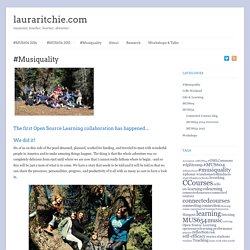
Six of us on this side of the pond dreamed, planned, worked for funding, and traveled to meet with wonderful people in America and to make amazing things happen. The thing is that the whole adventure was so completely delicious from start until where we are now that I cannot really fathom where to begin. -and so this will be just a taste of what is to come. We have a story that needs to be told and it will be told so that we can share the processes, personalities, progress, and productivity of it all with as many as care to have a look in. This is us! As a group we had many goals that ranged from the global goals of wanting to inspire and facilitate connection through music making. The whole collaboration started basically with a phone call – well, a Skype – where I asked David Preston if I could come and he extended the invitation to include my students. There was an awful lot more that happened.
Wikimedia Foundation. American non-profit charitable organization As of 2017[update], the foundation employs over 300 people, with annual revenues in excess of US$109.9 million.[9] María Sefidari is chair of the board.[3] Katherine Maher has been the executive director since March 2016.
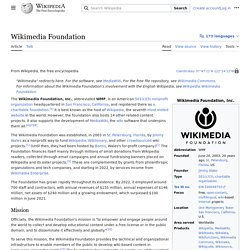
Goal[edit] The Wikimedia Foundation has the stated goal of developing and maintaining open content, wiki-based projects and providing the full contents of those projects to the public free of charge.[10] Another main objective of the Wikimedia Foundation is political advocacy.[11] History[edit] In 2001, Jimmy Wales, an Internet entrepreneur, and Larry Sanger, an online community organizer and philosophy professor, founded Wikipedia as an Internet encyclopedia to supplement Nupedia.
In April 2005, the U.S. Wikibooks. Peeragogy Handbook Version 3 - Plenary Session. Open Science Collaboration Blog · The State of Open Access. By Shauna Gordon-McKeon To celebrate Open Access Week last month, we asked people four questions about the state of open access and how it's changing.
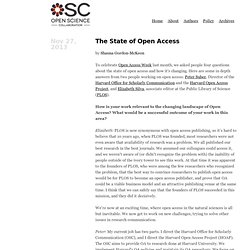
Here are some in depth answers from two people working on open access: Peter Suber, Director of the Harvard Office for Scholarly Communication and the Harvard Open Access Project, and Elizabeth Silva, associate editor at the Public Library of Science (PLOS). How is your work relevant to the changing landscape of Open Access? What would be a successful outcome of your work in this area? Elizabeth: PLOS is now synonymous with open access publishing, so it’s hard to believe that 10 years ago, when PLOS was founded, most researchers were not even aware that availability of research was a problem. We’re now at an exciting time, where open access in the natural sciences is all but inevitable. Peter: My current job has two parts. More Open Topics. Open Education Session 1 The facets of open education.
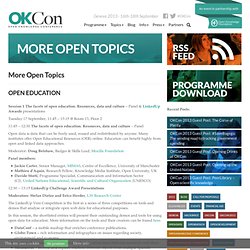
Resources, data and culture – Panel & LinkedUp Awards presentations Tuesday 17 September, 11:45 – 13:15 @ Room 13, Floor 2 11:45 – 12:30 The facets of open education. Resources, data and culture – Panel Open data is data that can be freely used, reused and redistributed by anyone. Moderator: Doug Belshaw, Badges & Skills Lead, Mozilla Foundation Panel members: Jackie Carter, Senior Manager, MIMAS, Centre of Excellence, University of ManchesterMathieu d’Aquin, Research Fellow, Knowledge Media Institute, Open University, UKDavide Storti, Programme Specialist, Communication and Information Sector (CI), United Nations Educational, Scientific and Cultural Organization (UNESCO) 12:30 – 13:15 LinkedUp Challenge Award Presentations.
Open Education Working Group. Open Education Handbook Booksprint. On 3rd September 2013 seventeen open education experts came together to begin writing the Open Education Handbook.
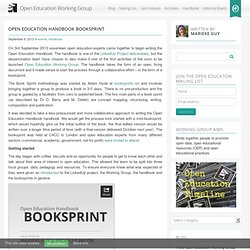
The handbook is one of the LinkedUp Project deliverables, but the dissemination team have chosen to also make it one of the first activities of the soon to be launched Open Education Working Group. The handbook takes the form of an open, living document and it made sense to start the process through a collaborative effort – in the form of a booksprint. The Book Sprint methodology was started by Adam Hyde at booksprints.net and involves bringing together a group to produce a book in 3-5 days. There is no pre-production and the group is guided by a facilitator from zero to published book. Connected Learners; A step-by-step guide to creating a global classroom eBook: Ann S Michaelsen. Course-builder - Course Builder. Education 3.0 and the Pedagogy (Andragogy, Heutagogy) of Mobile Learning. The evolution of the web from Web 1.0 to Web 2.0 and now to Web 3.0 can be used a metaphor of how education should also be evolving, as a movement based on the evolution from Education 1.0 to Education 3.0.
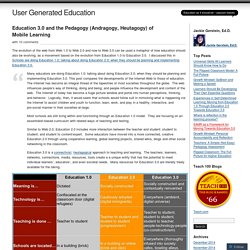
I discussed this in Schools are doing Education 1.0; talking about doing Education 2.0; when they should be planning and implementing Education 3.0. Many educators are doing Education 1.0; talking about doing Education 2.0; when they should be planning and implementing Education 3.0. This post compares the developments of the Internet-Web to those of education. The Internet has become an integral thread of the tapestries of most societies throughout the globe.
Open Textbokk and Open Education resource. Open Research & Learning. S.I.A.R. - Peeragogy. Free Downloads. New Web 2.0 tools for education. Debmorrison. Pearltrees. Educators in the United States face not one but two skill gaps - the gap in skills high school seniors have when they start college and the second, when college graduates begin their first job and are not prepared to do the job they were hired for.
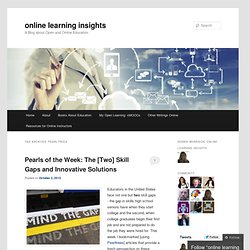
This week I bookmarked [using Pearltrees] articles that provide a fresh perspective on these problems along with potential solutions. And just how big are these gaps? Difficult to pinpoint, but it’s not closing, it’s widening, furthermore the United States ranks far below other developed nations in academic performance on high-school science, math and reading assessments. But there is hope. I conclude by sharing reports of four innovative approaches to education reform that have great potential to address the void.
The First Gap: High School to CollegeSAT® Report: Only 43 Percent of 2012 College-Bound Seniors Are College Ready. We Need more Access to A.P. Rigor is Better. (2011). The Second Gap: College to the WorkforceSkills Gap? Open Course: Social Media & Open Education. I will be facilitating an open graduate course this Fall titled EC&I 831: Social Media & Open Education.

This will be the 5th time I have taught the course (first time was 2007), and it’s different each time. It looks like I will have about 25 graduate students taking this for credit (which is well over the usual limit), and I’m also inviting anyone out there interested in the experience to participate for free. If you would like to learn more about the course, go to If you’re familiar with the course (from past iterations), you’ll notice that I’ve abandoned the old wiki and moved over to a WordPress site as the ‘central’ space. If you are interested in participating, see the page for non-credit participants. Google Launches Open Course Builder. Google launched an open source course building web application for the growing list of K-12 and big-name universities developing online classes.
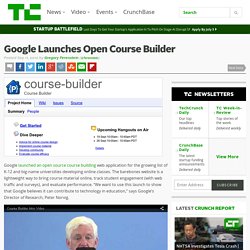
The barebones website is a lightweight way to bring course material online, track student engagement (with web traffic and surveys), and evaluate performance. “We want to use this launch to show that Google believes it can contribute to technology in education,” says Google’s Director of Research, Peter Norvig. Course-builder came off the back of an experimental Google class, “Power Searching with Google,” which went out to schools across the country to educate students on the more advanced features of Google for online research.
The power-searching course “was a strong success and also generated some technology that we thought would be useful to share with the world,” says Norvig. “We feel that by sharing the code that we’ve generated, we can impact more people in the education space. A Teacher’s Guide to Social Media. A Teacher’s Guide To Social Media [INFOGRAPHIC] Peer-to-Peer Learning Handbook. Human Capital Management. Open Education Ebooks Free Download.